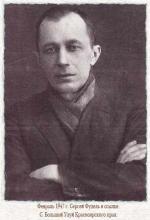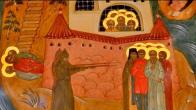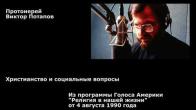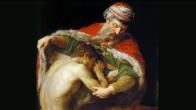You are here
Sergei Iosifovitch Fudel (1900-1977)
We would like to offer you biographical information on S. I. Fudel provided by one of his personal acquaintances, Archpriest Vladimir Vorobiev, Rector of the St. Tikhon Theological Institute in Moscow.
* * *
 Sergei Iosifovitch Fudel was born in Moscow on January 13, 1900. Throughout his entire life, Iosif Fudel kept the flame of a true Christian soul and succeeded in passing on that flame to his children. From early childhood, and to his death, Sergei Iosifovitch was in the Church, and his life is a part of the history of the Church.
Sergei Iosifovitch Fudel was born in Moscow on January 13, 1900. Throughout his entire life, Iosif Fudel kept the flame of a true Christian soul and succeeded in passing on that flame to his children. From early childhood, and to his death, Sergei Iosifovitch was in the Church, and his life is a part of the history of the Church.
[…]Sergei Iosifovitch Fudel did not write a history of the Church in the 20th Century, but he was a participant in its events. The fortunes of the Church became his life. The Revolution, the awful (and at the same time joyous) years during which Patriarch Tikhon administered the Church, the tragic time of troubles for the Church, Church life in the catacombs – he walked all of these paths. Three times, he was incarcerated, and together with many of the most important figures in the Church, with many martyrs, experienced exile. He soaked up that spirit of quiet, persecuted, Russian sanctity, and like a bee gathering honey, over the course of his entire life harvested bits of that sanctity from the fields of the Church even as they were rapidly diminishing and becoming impoverished. It is because his writings are filled with this true spirit that they are so valuable today. Everything that Sergei Iosifovitch wrote went through the crucible of his personal spiritual experience and bears within it [his] witness to the spirit of the times and of the Church. His works certainly do not open as many pages of theological scholarship, as do those of theologians (including Russian theologians) in the West. They certainly do not shine with learned erudition. However, on reading for example, Sergei Iosifovitch’s “Notes on the Liturgy,” one can readily get some sense of how the Russian New-hieromartyrs served Divine Liturgy in prison, one can communicate with them and learn both their trepidation and their tenderness, their suffering and the triumph of their sanctity. It is as if the patristic commentaries on the Liturgy that formed the foundation of Sergei Iosifovitch’s work had been written not hundreds of years ago, not a millennium ago, but today, by contemporaries, who made fast and confirmed every word with their own blood. The passage of time has not separated us from the saints of ancient times, has not sundered the single experience of the Church. It may well be that this is the explanation of the Liturgy most essential in our days.
Fudel spent the last years of his life in the town of Pokrov, in the Vladimir oblast’ [administrative region]. He remained constrained by its one hundred kilometer boundary to the end, and he was never again able to return to or even approach Moscow. Sergei Iosifovitch was extremely ill for a long time, and on March 7, 1977, he reposed in Pokrov, in the house he had filled with prayer; he was committed to the earth in Pokrov as well.
That last part of his life was, like his entire life, harsh and difficult. Constant deprivation and illness, gradually developing blindness as the result of glaucoma, separation from his children and relatives, all combined with the lack of food provisions, with having to stoke the stove and carry water from the well - in short, ordinary Russian provincial existence. In his letters, he wrote, “ …it is hard without the fellowship of friends. Here, it is as if in a desert.” “I am utterly alone and cannot even read, as my eyes are often clouded… “It is a time of terrible loneliness….”
Not far from Sergei Iosifovitch’s house there is an ancient church, the only one functioning in the whole okrug [district]. There, Sergei Iosifovitch constantly served as a tonsured reader. Also, he was always writing. It was during that period, beginning in 1956, that he wrote all of his works. He would have to make very tiring trips to Moscow on business. Sometimes, most often in the summer, he would manage to spend some time living in Moscow, work in the library, and visit some one of those who remained of his large circle of friends and acquaintances.
Sergei Iosifovitch’s entire aspect and cast of mind reflected his constant striving towards the spiritual world. He was kept steadfast in his earthly life by his need to walk his path according to the will of God, with love for others, and retaining the hope of still being of use to the Church. The sorrows laid upon him left their permanently visible mark. It is as if he constantly remembered and saw that evil which mercilessly devours the world, and had learned to be humbly conscious of his weakness, to meekly hope in the mercy of God. His acquired experience made him careful in judgment, and imparted especial profundity to each word and opinion. I remember having the impression that Sergei Iosifovitch knew something secret, something that could not be related, perhaps something that is inexpressible. Nonetheless, he was able to relate an amazing amount in each of his words. A certain measure of the mark of endless sadness, of being not of this world, of incompatibility with the world around him, a sorrowful smile, a momentary utterly piercing glance, a calm, quiet, measured and not tiresome manner of speech, readiness to listen or to be silent and to pray – all of this formed an image in complete contrast to that of the hero of our times. It seemed that Sergei Iosifovitch’s appearance and demeanor was saying, “Love not the world, neither the things that are in the world.” (I John 2: 15), “…seek ye first the Kingdom of God and His righteousness.” (Мatthew 6: 33). He was repelled by any mask of spirituality, by unctuousness, pretense, or lack of candor. He avoided the mighty of the earth, and showed an eager preference for the outskirts rather than the center.
In our days, when the New Martyrs and Confessors of the 20th Century are being glorified, when we are once again getting to know and comprehend the recent awful, and at the same time, great, history, the extremely valuable spiritual heritage of Sergei Iosifovitch, eyewitness and participant in [that history], will help us find our roots, will help us re-establish our spiritual heritage and succession, and ultimately to return to faith in God.
Address of our Cathedral
Subscribe to our mailing list
While all the materials on this site are copyrighted, you may use them freely as long as you treat them
with respect and provide attribution on the Russian Orthodox Cathedral of St.John the Baptist of Washington DC.









